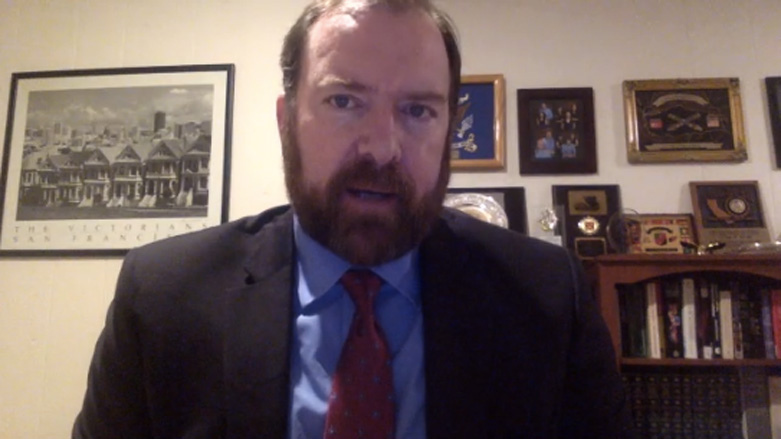US supports intra-Kurdish dialogue in northeast Syria: Official

ERBIL (Kurdistan 24) - A senior advisor to the US special envoy for Syria, James Jeffrey, during an online event organized by the Turkish pro-government SETA Foundation in Washington on Wednesday stated that the US supports intra-Kurdish dialogue talks recently held by Kurdish parties in Syria.
“The United States supports this kind of dialogue to broaden pluralization of politics and normal political life. It is a long way off of that. I don’t think that people should read too much into that,” said Richard Outzen, Jeffrey’s advisor.
The Democratic Union Party (PYD) and the Kurdish National Council (KNC), the two major rival factions among Syrian Kurdish parties, have continued negotiations that began in early November to discuss the need for unity after Turkey’s cross-border offensive in northern Syria in October.
“As a general proposition, we support those talks and we support broadening of the political space in the northeast,” Outzen added.
He also said that there should be talks between the Turkish opposition and Syrian Kurds.
“The autonomous administration—whatever you want to call it, I don’t want to get into pejoratives, whatever, the folks that are running most of the northeast right now—and the folks that are running the other parts of it, like the Turks and the Turkish-supported opposition and the broader opposition, all need to talk,” he continued.
Outzen underlined that it is the US position that “dialogue among different political forces and groups in northeast Syria is needed.”
However, he added that it’s not about external representation nor linked to the Geneva peace talks between the Syrian opposition and the Syrian government that might resume in the near future.
“It’s about how does administration and how does life in the northeast of Syria work and what are the political freedoms.”
Nevertheless, he said he hopes this will fold right into UN Security Council resolution 2254, which calls for a ceasefire, free elections, and a political transition.
Ambassador James Jeffrey during an event organized by the Atlantic Council on April 30, also stated that the US has only one principle involving all Syrian opposition groups, including the Syrian Democratic Forces (SDF) and the local administration that “are part of that general opposition.”
“Our only political agenda for them is to support the 2254 process that allows a new constitution,” he stressed, adding that this includes free and fair elections managed by the UN, as he underlined that the US does not support any political group.
Tensions between the two Syrian Kurdish opposition groups, the KNC and PYD, have increased since the outbreak of the Syrian civil war in 2011, with the latter playing a significant role in the establishment of the self-administration that has ruled northeastern Syria.
The two have not successfully cooperated as had been hoped, in part because agreements they reached in Duhok and Erbil between 2012 and 2014 were never effectively implemented.
The United States has publically supported the SDF’s initiative to unite the Kurdish parties in Syria.
In a meeting with Kurdistan Region President Nechirvan Barzani on May 13, US Consul General in Erbil Steven Fagin praised Barzani’s efforts to unify various Kurdish-led political factions in Syria.
In late April, William Roebuck, Deputy Special Envoy to the Global Coalition to Defeat the Islamic State, met with several Kurdish parties to discuss the unification initiative.
Nicholas A. Heras, Middle East Portfolio Manager at the Institute for the Study of War, told Kurdistan 24 that the “US is seeking to stabilize the governance structure of northeast Syria.”
“The counter-ISIS campaign requires a stable and inclusive governance structure in northeast Syria and that is impossible without a unified Kurdish political position on the future of Syria.”
Neşet Zaza, a senior official of the Kurdistan Democratic Party-Syria (KDP-S), one of the leading parties of the KNC, told Kurdistan 24 on Wednesday that the KNC does not have any problems with groups within the party, nor does it opposes any other Kurdish party in Syria.
“As the KNC, our position from the beginning is that the Kurds should all unite under one umbrella against their friends and enemies.”
“But there are some issues between the KNC and especially the TEV-DEM (PYD-linked umbrella) and PYD and they need to be resolved and reach an agreement that will serve our people.”
So far, the KNC and PYD have not reached a workable compromise, but talks are expected to continue.
Editing by John J. Catherine
